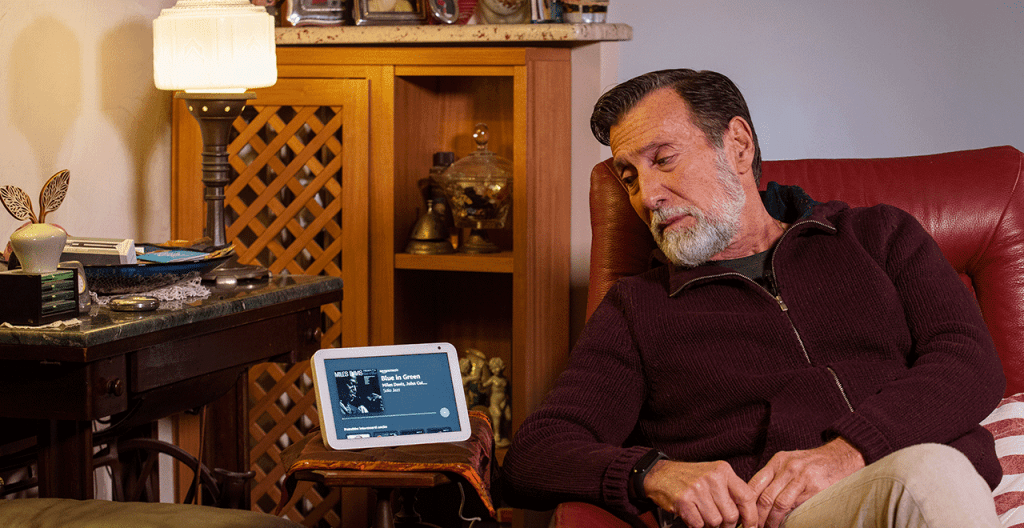Voice4health: using voice assistants to promote positive ageing


The health emergency caused by the pandemic has highlighted the importance of factors contributing to active ageing, defined as a process of optimising health, social participation and security to improve the quality of life of older people.
Datawizard, in collaboration with the EngageMinds HUB research centre of the Università Cattolica and with an unconditional contribution from Amazon, conducted a study to evaluate the effectiveness of a self-help psychological protocol supported by the use of voice-activated intelligent personal assistants to promote well-being and active ageing in the elderly population.
“We were the first promoter of this project for Amazon Europe and the research data we examined was very significant,” said Dr Riccardo Emmolo, Digital Strategist at Datawizard, who co-designed and implemented the experiment with EMH.
The study showed that despite the fact that older people are less accustomed to using technology, they benefit from voice assistants by improving their quality of life, well-being and reducing their sense of loneliness.
Voice4health’s findings confirm a fairly clear picture:
In the next 2-3 years, digital technologies will have
a decisive impact on the so-called “Silver economy”.
Specifically, voice assistants, but more generally any communication device equipped with artificial intelligence, are increasingly effective tools for identifying potential health problems, but also for breaking down barriers and difficulties that make many older people demotivated and more vulnerable to social isolation, a phenomenon that often precedes cognitive decline and other health problems.
The voice: a cheap interface for the elderly
During the experiment, it was interesting to observe how voice turned out to be a “cheap interface” for older people: it requires little learning and leaves the person free to perform other tasks or to adopt comfortable positions. This once again confirms the importance of designing ‘digital experiences’ – not just services – that can improve their lives, their relationships, their habits, the way they care for themselves and their self-sufficiency.
Indeed, the study highlights the potential of intelligent voice assistants not only to support people in their daily activities, but also to contribute to their well-being.
Voice4health: a scientifically validated research protocol
Datawizard, together with the EMH test centre, was responsible for the design and implementation of the experiment, which was based on a research protocol involving four interviews at two-week intervals for each participant using the CATI method.
The experiment, conducted over a six-week period, used a ‘one-to-one’ methodology: each participant was assigned a reference operator to administer the questionnaire.
This approach encouraged a positive attitude towards telephone contact from the participants, and provided direct evidence of the contribution to change made by the Alexa voice assistant on the days when the subjects became familiar with the device.
The Voice4health study used scientific tools to investigate whether the use of these devices by older people could contribute to improving their quality of life, in addition to facilitating many daily activities.
And the results, although still preliminary, are more than encouraging. The study involved 60 men and women aged between 65 and 80. At the end of the six-week trial, three out of four people experienced an increase in well-being, both in general and in emotional and relational terms.
What’s more, the people who took part in the study – which followed a scientifically validated research protocol involving the use of the Alexa voice assistant – reported a significant reduction in psychological stress and an improvement in their personal attitude towards the use of technology.
This research comes from a “secret garden”
From a methodological point of view, the scientific matrix that gave rise to this research is derived from another protocol called “The Secret Garden” (www.covidfeelgood.com), the results of which have already been published internationally. This is an immersive video that simulates a natural environment and is designed to promote relaxation and self-reflection. This was complemented by a series of exercises using the features of the voice assistant used in the study: games, music, video calls, questions and answers, news and more.
During the first week of the study, participants were asked to complete a series of exercises based on the voice assistant’s applications; during the second week, they were free to use the device as they wished. During the second week, they were free to use the device as they wished, as long as they kept a diary of their actions and feelings, which the Catholic University researchers analysed along with four questionnaires at the end of the six weeks.
Alexa could be a tool to counteract the isolation and feelings of inadequacy experienced by older people as their autonomy and sociality decline.
The encouraging results of the latest study draw attention to the importance of adapting and including older people in today’s increasingly digital society. The use of the Alexa voice assistant also proved useful in bringing older people closer to their loved ones, providing an effective bridge to younger generations – such as their grandchildren.



